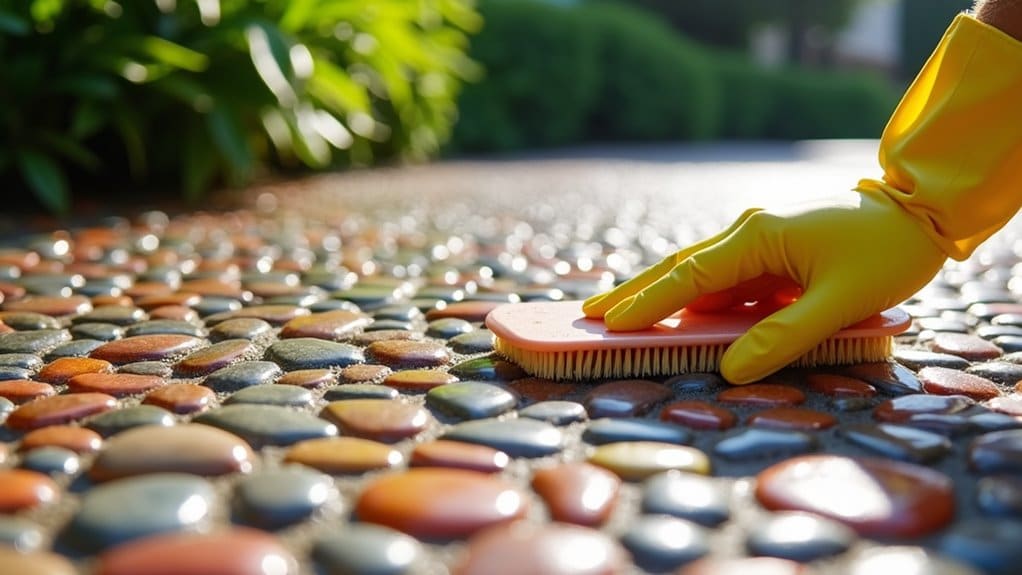Resin bound surfacing typically lasts 15-25 years with proper care. The key to longevity lies in quality UV-stable resins and correct drainage – think of it like a good pair of wellies that need proper storage and care. Regular maintenance is straightforward: sweep debris regularly and check for damage each season, particularly after harsh weather.
Heavy vehicles are best avoided, much like you wouldn't drive a lorry across your garden path. For driveways and car parks, extra reinforcement during installation is vital. A properly installed sub-base (the foundation beneath) is crucial – it's similar to building a house on solid foundations rather than sand.
Prevention beats cure: tackle small repairs promptly, keep the surface clean, and watch for signs of wear. With these basics sorted, your resin bound surface should serve you well for decades.
Key Takeaways
Resin bound driveways and paths last 15-25 years when properly maintained – that's about the same lifespan as a quality kitchen renovation.
Regular upkeep is straightforward: give it a good sweep, check for issues each season, and pressure wash once or twice yearly – much like you'd maintain garden decking.
UV-stable resins and proper stone mixes are worth the investment. They prevent that yellowing you might spot on cheaper surfaces, particularly in sunny spots like south-facing driveways.
Sort out drainage issues quickly and fix any damage straight away. A puddle left unaddressed can lead to cracks, rather like ignoring a leaky gutter on your house.
For areas with lots of traffic, like your main driveway or a busy shop entrance, go for a 15-18mm thickness. Think of it like choosing a thicker carpet for high-footfall areas – it simply lasts longer.
Lifespan of Resin Bound Surfacing
Resin bound surfacing typically lasts 15 to 25 years, and often longer with proper care – outlasting traditional tarmac and concrete driveways. This makes it a smart long-term investment for UK homeowners.
Quality installation is crucial. The right aggregate mix and proper sub-base preparation provide the foundation for a durable surface that won't crack or wear prematurely. Think of it like building a house – without solid foundations, even the best materials won't perform properly. A well-prepared base with proper drainage helps in achieving a greater lifespan.
Professional installation is a must. A qualified contractor will ensure correct mixing ratios and application techniques, helping avoid common problems like loose stones or surface inconsistencies. Additionally, installation quality significantly impacts the overall longevity of the surface.
Regular maintenance is straightforward – simply sweep the surface and check for any issues during spring and autumn.
To maximise lifespan:
- Choose UV-stable resins to prevent sun damage
- Ensure proper drainage during installation
- Keep the surface clean and free from debris
- Address any repairs promptly
With these measures in place, your resin bound surface should serve you well for decades, proving its worth as a practical and lasting choice for British driveways and paths.
Factors Influencing Durability
Factors Influencing Durability
Several key factors affect how long resin bound surfacing lasts. Each plays a crucial role in the material's overall performance and lifespan.
| Factor | Impact on Durability | Recommendations |
|---|---|---|
| Material Quality | High-quality resins resist UV damage and weather wear. | Choose UV-stable resins and tough aggregates. |
| Environmental Conditions | British weather can cause cracking and fading. | Ensure proper drainage and use weather-resistant materials. |
| Usage and Traffic | Heavy traffic shortens lifespan. | Plan traffic flow, especially in busy areas. |
Traffic management matters most in commercial spaces like shopping centres and car parks, where specific resin blends help withstand constant foot traffic. Resin driveways are designed to maintain structural integrity under heavy usage. Whilst appearance is important, it shouldn't come at the cost of durability – quality materials maintain both looks and strength. Regular upkeep, including simple cleaning and checks, helps the surface last longer. Proper installation and maintenance ensures your resin bound surface stays practical and smart-looking for years.
Importance of Quality Installation
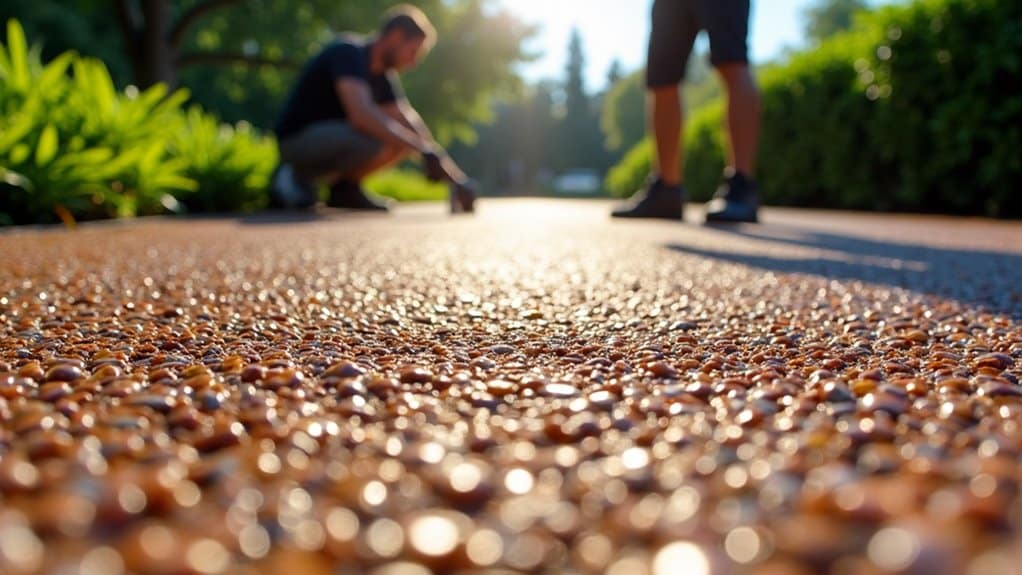
Quality Installation: Essential for Resin Bound Surfaces
Professional installation directly affects how long your resin bound surface will last and perform. A properly installed surface prevents costly damage and maximises your investment.
Key installation requirements:
- Solid Sub-base: A robust concrete or tarmac foundation prevents cracking and ensures stability.
- Level Surface: Clean, even ground allows proper resin setting.
- Precise Mixing: Correct aggregate-to-resin ratios guarantee durability. Proper resin mixing techniques are crucial for achieving the best results in your installation.
- Professional Installation: Skilled contractors ensure proper 12-24mm depth and smooth finish.
- Forced Action Mixer: Essential equipment for thorough blending of materials.
Poor installation techniques often lead to structural issues and surface cracks. A properly primed surface improves adhesion, whilst correct preparation prevents future problems. Moreover, ensuring a seamless surface during installation can significantly enhance the longevity and performance of your resin bound surface.
Getting these basics right means your resin bound surface should serve you well for many years.
Material Quality Considerations
Material quality directly affects your resin bound surface's long-term performance. UV-stable resins protect against British weather, preventing the yellowing and fading commonly seen in cheaper alternatives. For best results, opt for high-grade aggregates from trusted UK suppliers – these create stronger bonds with the resin and resist the wear and tear of daily foot traffic. Furthermore, investing in high durability materials ensures that your surface can withstand weights up to 400 tonnes per cm², enhancing its lifespan significantly. Additionally, the porous nature of resin bound surfaces enhances water drainage, further contributing to their durability. Think of it like choosing quality paving stones: invest in proper materials now to avoid costly repairs later.
Importance of UV Stability
UV Stability in Resin Surfacing
Selecting UV-stable materials for resin bound surfaces is crucial for British weather conditions. A quality UV-stable resin protects your investment and ensures the surface stays looking fresh for years to come.
Key benefits of UV-stable resins:
- UV Protection: Prevents yellowing and fading, particularly important for driveways and paths exposed to direct sunlight
- Better Flexibility: Reduces cracking, especially during Britain's frequent temperature changes
- Colour Retention: Keeps the original colour vibrant, whether it's a garden path or car park
- Weather Resistance: Withstands British rain, frost and sun exposure
- Less Upkeep: Saves time and money on maintenance compared to standard resins
Much like choosing UV-protected garden furniture, picking UV-stable resin is essential for lasting results. The controlled curing process ensures optimal performance and finish consistency, further enhancing the durability of your surface.
The initial higher cost typically pays off through extended lifespan and reduced maintenance needs.
Selecting Durable Aggregates
Selecting the right aggregates is crucial for a long-lasting, reliable resin bound surface. Quality aggregates play a massive role in how well your surface performs and how long it lasts.
Whilst looks matter, the type of aggregate you choose affects both appearance and strength. Choose graded and processed aggregates to avoid problems with dust and damp, ensuring they bond properly with resin binders.
Kiln-dried materials work particularly well – much like how you wouldn't use wet sand to make concrete. Make sure your aggregates are properly washed, as dirty materials can lead to surface failures. Proper grading ensures an even finish, similar to laying a well-sorted gravel path.
Both natural and recycled aggregates can work brilliantly – whether you fancy the classic look of Cotswold stone or modern recycled glass. Just check they're compatible with your chosen resin binder. Additionally, selecting from an extensive selection of washed and kiln-dried aggregates can enhance your project's overall success.
Get these basics right, and you'll end up with a surface that not only looks smart but stays that way for years.
Regular Maintenance Practices
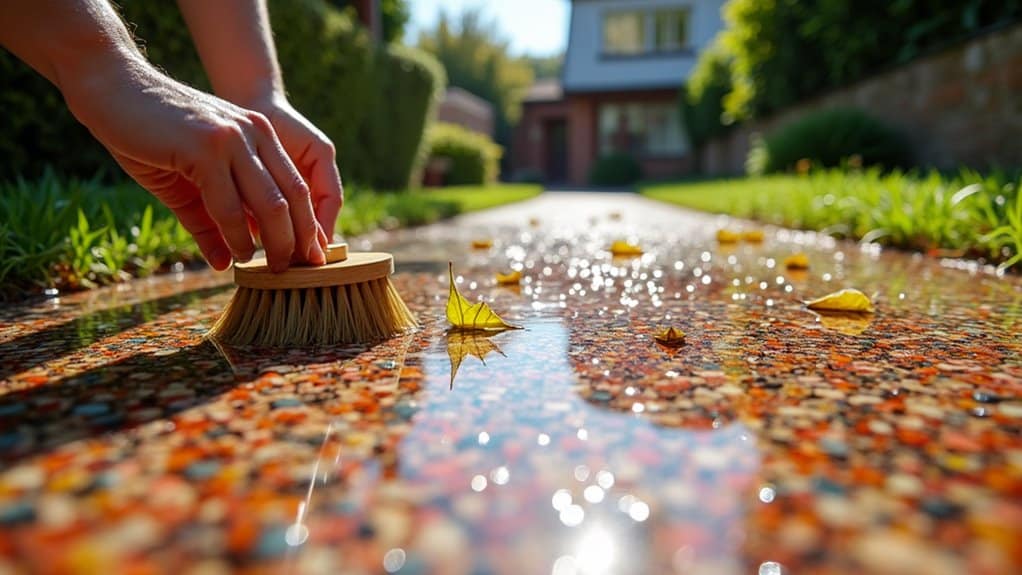
Maintaining Your Resin Bound Surface
Regular maintenance ensures your resin bound surface stays durable and looks great for years. Five essential maintenance practices:
- Daily Sweeping: Remove leaves and debris with a stiff-bristled broom or soft brush.
- Regular Hosing: Combine with sweeping to shift stubborn dirt.
- Pressure Washing: Use low to medium pressure (below 150 bar) once or twice yearly, ensuring a safe distance to avoid surface damage.
- Chemical Cleaning: Apply gentle, non-abrasive cleaners with a soft brush and rinse well.
- Deep Cleaning: A rotary cleaner works best for thorough maintenance. Regular sweeping removes debris and leaves and prevents rot and stains, further enhancing the longevity of your surface. Implementing seasonal maintenance practices minimizes the build-up of harmful substances.
Frequent cleaning prevents staining and surface damage.
Standard household detergents work well, but avoid harsh chemicals that could harm the resin.
Think of it like caring for your car – regular washing prevents long-term damage and keeps it looking smart.
Stick to these basics, and your resin bound surface should maintain its quality and appearance for years.
Environmental Impact on Longevity
The longevity of resin-bound surfaces depends heavily on British weather patterns and environmental conditions. UV rays from direct sunlight can affect the surface's colour and strength, whilst frequent rain and frost cycles typical in the UK create additional stress. Good drainage is vital – properly installed surfaces allow rainwater to flow through, preventing puddles and reducing winter frost damage. For maximum durability, consider local conditions; coastal areas need extra UV protection, whilst properties under trees require enhanced drainage to handle leaf debris and organic matter. Additionally, high-quality resins contribute significantly to the overall lifespan by resisting degradation caused by environmental factors. Incorporating permeable paving solutions may further enhance water management, thus increasing the durability of surrounding surfaces.
UV Resistance Effects
UV Resistance Effects
UV resistance is crucial for the lifespan of resin bound surfaces, particularly in areas with strong sunlight exposure. UV rays break down chemical bonds in the resin, causing colours to fade and lose their brightness.
Consider these key points about UV resistance:
- Fading: Much like garden furniture left in the sun, UV rays cause colour degradation over time.
- Material Choice: UV stable resins (aliphatic polyurethane) outperform standard resins (aromatic polyurethane) for colour retention.
- Protection: Built-in UV-resistant properties shield colour pigments from sun damage.
- Discolouration: Non-UV stable resins tend to turn yellow-brown, especially in shaded spots like under trees or awnings. Heavy usage can also accelerate wear and affect the appearance of the driveway.
- Value for Money: Whilst UV stable surfaces cost more initially, they need less maintenance and last longer, saving money over time.
Weather Conditions Impact
Weather's Impact on Resin Bound Surfaces
Weather conditions significantly affect resin bound surfacing performance and longevity. Temperature extremes pose particular challenges – excessive heat softens the resin, whilst severe cold can cause cracking, potentially reducing the surface's lifespan by five years. British rainfall and humidity levels need careful consideration, as both can compromise the resin's structural integrity. Proper moisture management during installation is crucial to prevent issues such as bubbling or delamination.
| Weather Condition | Impact on Resin Bound Surfacing |
|---|---|
| High Temperatures | Softens resin, leading to impressions and weakness |
| Severe Cold | Causes cracking due to freeze-thaw cycles |
| Heavy Rainfall | Erosion and weakening of resin bond |
| High Humidity | Affects bonding process and curing |
| Moisture during Install | Leads to bubbling, delamination, or surface weakness |
Much like painting outdoors, timing is crucial. Check the weather forecast before installation – aim for moderate temperatures and dry conditions to ensure proper curing. Installing during typical British summer temperatures of 15-20°C typically yields the best results.
Drainage Benefits Overview
Effective drainage is crucial for maintaining resin bound surfaces across the UK. Good drainage practices deliver significant benefits for your property's exterior:
- Permeability: Resin bound driveways naturally filter rainwater through their surface, much like a coffee filter, preventing standing water.
- Groundwater Benefits: Water seeps through to replenish underground reserves, easing the strain on local drainage networks – particularly vital during British winters. This permeability feature allows for efficient water absorption, reducing the risk of surface runoff.
- Cleaner Water: The surface acts as a natural filter, trapping oil and other vehicle pollutants before they reach rivers and streams.
- Flood Protection: Proper drainage tackles the common UK problem of surface water flooding, especially during heavy downpours.
- Extended Life: Well-drained surfaces last longer and need less maintenance, saving you money on repairs and replacements.
The text maintains British English spelling and focuses on UK-relevant concerns while keeping explanations clear and relatable.
Handling Heavy Traffic
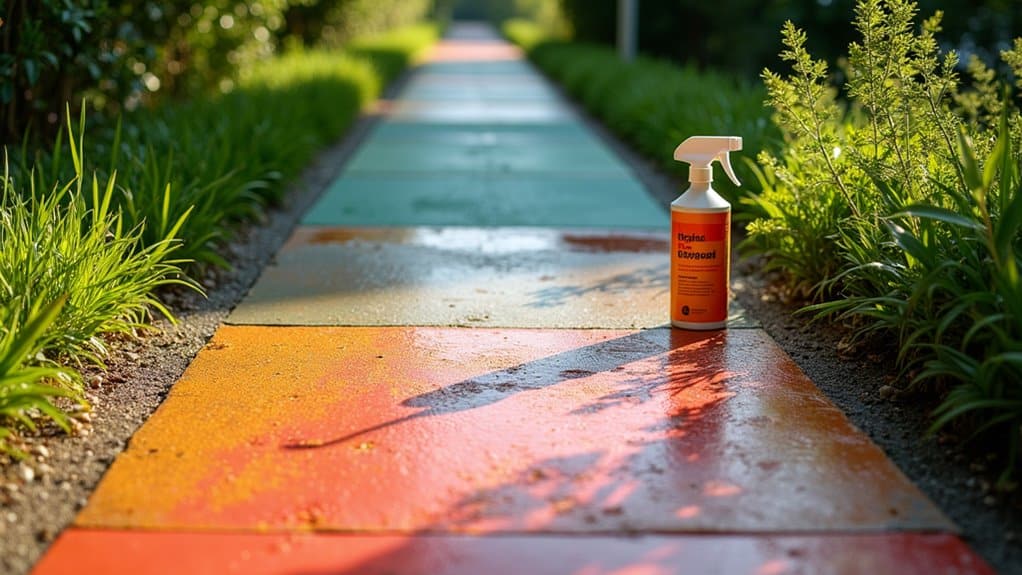
Managing Heavy Traffic on Resin Bound Driveways
A well-planned resin bound driveway can handle heavy traffic, but you'll need to get the basics right. Start by working out what vehicles will use it – whether it's just family cars or larger vehicles like delivery vans.
Choose quality materials for busy areas: UV-stable resin and robust aggregates are essential. The surface should be 15-18mm thick for areas with frequent vehicle use. Additionally, utilizing polyurethane resin provides increased crack resistance for high-traffic scenarios.
A proper sub-base is crucial – skimp on this, and you'll face problems later. Additionally, ensure that the driveway adheres to Sustainable Urban Drainage Systems (SUDS) to promote effective drainage and reduce strain on the driveway.
Bear in mind that heavy vehicles will reduce your driveway's lifespan. Whilst most resin driveways last 15-20 years, heavy use might cut this to about ten years.
Keep the surface in good nick with regular brushing and occasional pressure washing. Watch out for oil leaks and avoid leaving sharp objects on the surface, as these can lead to significant damage over time.
Following these guidelines will help ensure your driveway stays looking smart and performs well under regular use.
If you're unsure about specifications, consult a local specialist who understands UK weather conditions and traffic requirements.
Seasonal Care and Inspections
Regular upkeep of your resin bound driveway is essential for maintaining its quality, particularly after heavy use.
A seasonal maintenance routine ensures your investment lasts longer and keeps its smart appearance.
Follow this practical inspection guide:
- Spring: Give a thorough clean, pull out any weeds, check for winter damage and reseal worn areas. This will help protect your driveway from UV rays that can cause fading and deterioration. Additionally, professional maintenance can help identify potential issues early.
- Summer: Keep the surface clean, tackle any oil or fuel marks quickly, and watch for damage from heavy vehicles or direct sunlight.
- Autumn: Sweep fallen leaves regularly, clear your gutters, look for cracks and seal them before winter sets in. Proper drainage management during this season is crucial for maintaining aesthetics.
- Winter: Clear snow straight away, use suitable grit or salt products, keep heavy machinery off the surface and check often for frost damage. Avoid using metal tools, as they can cause scratches on the surface.
Recommendations for Long-Lasting Surfaces
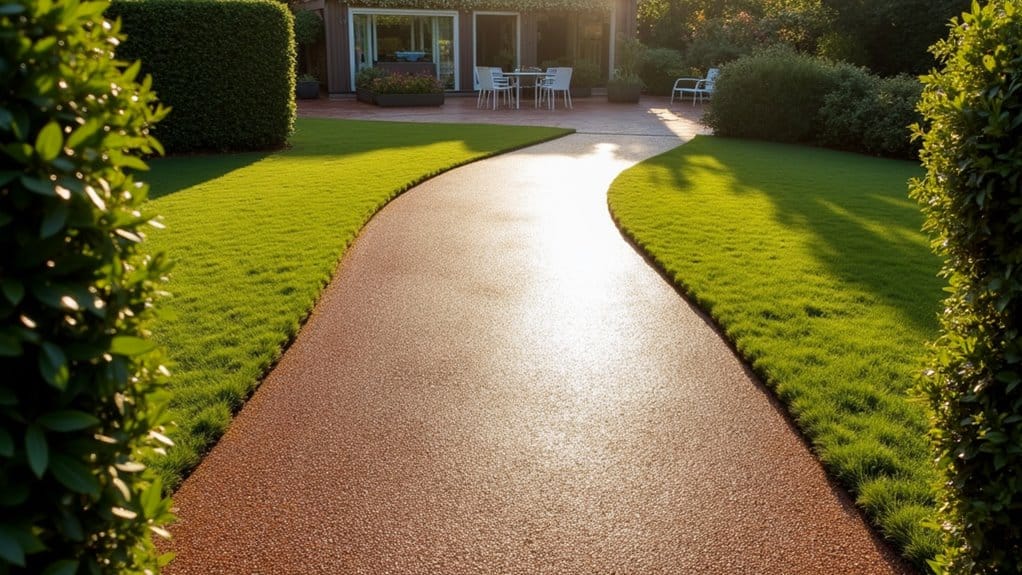
Resin Bound Surface Durability Guide
The longevity of resin bound surfaces depends on three key elements: material quality, proper installation and regular upkeep. Essential recommendations:
| Factor | Recommendation | Benefit |
|---|---|---|
| Quality of Materials | UV-stable resins | Better colour retention |
| Installation Quality | Professional installation | Ensures proper application |
| Traffic Load | Restrict heavy vehicle access | Minimises wear |
| Environmental Factors | Opt for shaded areas | Reduces UV damage |
| Regular Maintenance | Routine cleaning | Prevents debris accumulation |
Regular maintenance should include sweeping and gentle pressure washing. Use mild soap solutions for stubborn stains, and clean spills immediately to prevent permanent marks. Avoid using harsh cleaning products, as these can damage the resin binding. Additionally, keeping the surface clean is essential for enhancing longevity and aesthetic appeal. Ensuring that your surface is properly installed can also significantly contribute to reducing the likelihood of cracking and damage.
Simple maintenance tips:
- Sweep weekly to remove loose debris
- Pressure wash quarterly at low settings
- Address oil or fuel spills straight away
- Check for cracks or loose stones monthly
Following these guidelines will maintain your surface's appearance and structural integrity. Regular checks help spot potential issues before they become serious problems.
Frequently Asked Questions
Can Resin Bound Surfacing Be Repaired if Damaged?
Resin bound surfaces can be repaired when damaged. Small fixes involve patching with matching resin and aggregate, much like filling a chip in your driveway. For larger damage, a professional can cut out the affected area and seamlessly blend new material with the existing surface. The key is using identical materials to ensure the repair matches the original finish.
What Colors Are Available for Resin Bound Surfacing?
Resin bound surfaces come in a broad range of colours, from warm golds and subtle creams to classic greys and browns. Mixing different shades creates striking patterns and borders, perfect for driveways, patios and garden paths. Whether you prefer natural stone tones or bold contemporary looks, there's a colour scheme to match your property's style.
Is Resin Bound Surfacing Suitable for Driveways?
Resin bound surfacing makes an excellent choice for UK driveways. The surface combines small stones with clear resin to create a tough, permeable finish that stands up well to British weather. It's particularly good for meeting SUDS regulations, as rainwater drains straight through rather than pooling or running off into street drains. Think of it like a giant sponge for your driveway. Whilst it costs more upfront than traditional tarmac or concrete, proper installation on a solid base will ensure it lasts for years with minimal maintenance.
How Does Resin Bound Surfacing Handle Freezing Temperatures?
Resin bound surfaces cope remarkably well with British winter conditions. The material's natural flexibility prevents cracking when temperatures drop below freezing, unlike traditional concrete or tarmac. A properly installed resin bound surface, much like a well-fitted winter coat, expands and contracts with temperature changes whilst maintaining its structural integrity. Perfect for driveways and pathways that face harsh frost and snow.
Can Plants Grow Through Resin Bound Surfacing?
Plants cannot grow through resin bound surfacing thanks to its permeable surface structure. Though tiny seeds might initially sprout, they fail to thrive as they can't access sufficient water, much like trying to grow plants through concrete. This makes resin bound surfaces naturally weed-resistant and keeps them looking tidy year-round.
Conclusion
A well-maintained resin bound surface typically lasts 15-20 years when properly installed and cared for. Regular sweeping, pressure washing and prompt stain removal help maintain its durability. Key factors affecting longevity include proper installation by qualified professionals, quality materials and appropriate drainage. Whilst it requires minimal upkeep compared to other surfacing options, neglecting basic maintenance could lead to weed growth, surface damage or drainage issues. To protect your investment, schedule annual deep cleans and address any cracks or loose stones promptly.
